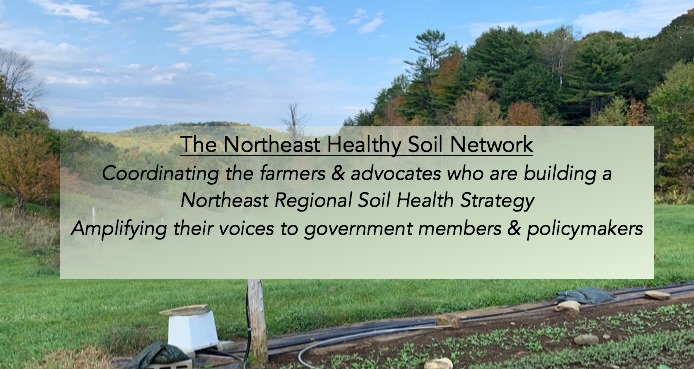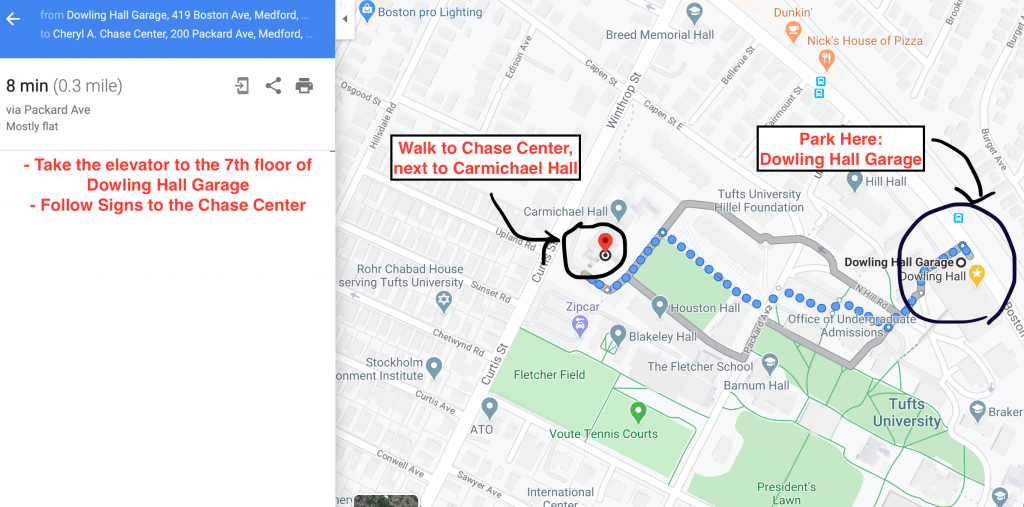
The Northeast Healthy Soil Network Presents:
Agriculture and Climate in the Northeast: Soil and Ecosystem Health
Thursday, February 20, 2020

The Northeast Healthy Soil Network is gathering for a two-day symposium, to strengthen and aid the healthy soil movement in the Northeast region, by fostering communication and collaboration amongst us all.
Thursday, February 20th Schedule
The event will take place at the Cheryl A. Chase Center, Tufts University, Medford Campus.

It will begin with an all-day in-depth policy working group focus on two topics:
1. Farm Viability: In order to employ healthy soil practices, Northeast farmers will need to remain financially viable. What barriers exist to financial viability in the Northeast and how can an increase or redirectment of state agricultural investment towards healthy soil management overcome these barriers?
2. Ecosystem Service Measurement: Healthy soil management provides critical ecosystem services to our societies, including water quality, drought resilience, erosion and nutrient runoff pollution prevention, infrastructure conservation, biodiversity and pollinator habitats and perhaps most importantly, nutritious, sustainable food crops. What data is needed to re-shape state farm support policy to encourage healthy soil management? What policies can be effective in rewarding the value of the services provided by healthy soil farming practices – spending taxpayer dollars on preserving soils, rather than investing to clean up the costs of their degradation?
The Northeast Healthy Soil Network soil health policy working group Agendas
A working group on regional strategies for strengthening and spreading healthy soil management strategies throughout the Northeast region. The Thursday working group will gather agricultural stakeholders already involved in soil health programming, business strategy or policy activity and encourage knowledge exchange between groups.
Creating Visibility, to Spark Collaboration within the Northeast Healthy Soil Movement
The Thursday working group will gather agricultural stakeholders who, already involved in soil health programming, business strategy or policy activity, have been in communication with the Northeast network, and encourage the groups to brainstorm ways of making their work more visible and accessible to those hoping to invest in or pass policy to spread healthy soil agriculture across the northeast.
On Thursday, we have the opportunity to gather agricultural stakeholders with a shared goal, to strengthen a regional framework of collaboration towards advancing healthy soil agriculture in their region. Central points about Network member’s projects, work and all stakeholders supporting the spread of healthy soil agriculture in the Northeast that are discussed today will be formatted so they can be posted to the Soil First web platform, a new organizing space for the soil health movement.
Agenda, February 20th
| Time | Session | Content & Questions | Minds |
|---|---|---|---|
| 10:00am-11:00am | Registration | ||
| 11:00am-11:40am | Becoming a “Northeast Healthy Soil Network working group” | Finding comfort and connection with each other. Brainstorming the day’s agenda. Suggested guiding goal of the day - VISIBILITY to spark Collaboration
| All |
| 11:40am-12:15pm | ME Climate Table, VT PES & MA HS Action plan progress update |
| Regenerative Design Group’s Keith Zaltzberg, Ryan Patch & Alissa White UVM as VT PES representatives |
| 12:15pm-12:30pm | Forrist introduces the Soil First platform | Forrist Lytehaause from Planetary Care https://planetarycare.org/ shares progress report from Soil First development team | All |
| 12:40pm-1:00pm | Calla Rose Presents via Skype | Calla Rose Ostrander shares insights about the California Healthy Soils Program as a case study of regional collaboration towards gaining state government support for healthy soil agriculture. What will our process in the Northeast look like? How can platforms like Soil First and OpenTEAM be harnessed to advance it? | Calla Rose, Didi Pershouse, all |
| 1:00pm-1:45pm | Luncheon | Collaborative thought exercise | Farmers among us invited to share their reactions. Didi Pershouse moderates |
| 1:50pm-3:50pm | Working Group I: Farm Finance | Pathways to generate investment in soil health management to establish parity for NE farmers What information, social network grassroots energy do we need to argue for expanding public-funded/private/market-oriented soil stewardship valuation support for healthy soil management farm support | Didi Pershouse, Ian McSweeney. All |
| 1:50pm-2:20pm |
| All | |
| 2:20pm-2:50pm | Alternative Investment Pathways we want to see in the Northeast - Carbon & ecosystem services
| All | |
| 2:50pm-3:30pm |
| All | |
| 4:00pm-5:45pm | Working group II on ecosystem service data | Creating data visibility to accelerate the movement
How do we coordinate activity in the data space so that it accounts for diverse farmer needs and advances policy in the NE? | Caro Roszell as potential co-leader. All |
| 5:45pm-6:00pm | Conclusion of the day | Discussion to be continued & Webpage structure determined during Friday 21st afternoon session | Lisa Fernandes UNH informs about upcoming FSNE New England Summit Paul Luu shares information about upcoming 4per1000 North American meeting in Montreal in March |
| 6:00pm-8:30pm | Proceed to the Residence of the Consul General of France, 194 Brattle Street, Cambridge, MA | Optional shuttle from Tufts to the Residence, and back. |
Resources to refer to in preparation for meeting:
VT Payment for Ecosystem Services Working Group Report
The Regenerative Farming & Green New Deal – Data4Progress Brief
The Soil First platform from Planetary Care
NOFA, NFFC, Food Solutions New England created toolkit on how communities can host forum on expanding market for locally-produced food.
Terms & Concepts to be familiar with
“What are Ecosystem services?”
Ecosystem services (ES) are “the conditions and processes through which natural ecosystems, and the species that make them up, sustain and fulfill human life”1 i.e. “the set of ecosystem functions that are useful to humans.”2 By adding other forms of capital and investment, people may amplify the benefits provided by ecosystems and may glean additional value from the ES. The value may be monetized, but can also be measured in other terms, including satisfaction (e.g. recreational enjoyment), public health costs avoided, or other benefits. In the context of farming in Vermont, key ecosystem services this group has identified to value are provision of clean water, flood mitigation, and carbon sequestration, in addition to the cultivation of food and fiber—the ecosystem services for which farmers are currently paid.” VT Payment for Ecosystem Services Working Group Report, page 4, 2020
The Green New Deal potential for Re-Establishing Farm Parity for healthy soil farmers in the NE
“The Old New Deal was based on grains, not perishable products that are harvested at the same time. The Green New Deal needs to deconstruct corporate concentration, build up community control. Bernie talked about taking on big pharma; we need to confront Walmart, Amazon, Archer Daniels Midland, Cargill. Agriculture can put carbon in the soil, best done on a local level. We need local processing, cooperative plants, we need to be creative about what to do about excess crop, create supply over the year, we can insist that the funding for the GND supports local cooperatives, food hubs are great models.” – Liz Henderson, NOFA NY
The Working Group Follow-up Discussion, Friday the 21st, Fletcher School
| Time | Session | Content | People | Location |
|---|---|---|---|---|
| 9:15am-1:30pm | Symposium Panels | See website | ||
| 1:30pm-2:30pm | Notes recapped. The State Soil Health Policy Page introduced, Northeast forum concept proposed |
| GDAE RAs & webpage collaborators | Room 701, Cabot Center, Tufts Fletcher School |
| 2:45pm-5:00pm | Concluding Group work | Consolidated points from Thursday 20th discussion, further resources put forward | All | |
| Forrist skypes in again | Q&A with Forrist about Soil First | |||
| Web forum suggestions collected | OpenTEAM & Soil First Platform interacted with | All | ||
| Next steps discussed, next meeting date set | Upcoming summer FSNE regional colloquium discussed, pre-meeting workshop planned for July 8th | FSNE team, Lisa Fernandes UNH Sustainability Institute | ||
| Network members commute home |
